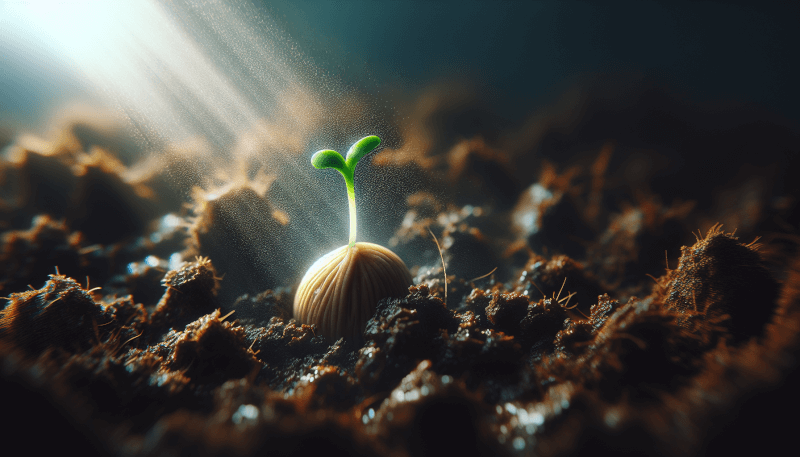👋 Click the mic button to talk to Alfred, the Todd's Seeds Gardening/Sprouting Expert – Feel free to ask him anything!
Ask Virtual Todd Anything - Click the Mic
Have you ever wanted to add a fresh burst of flavor to your meals? Look no further than sprouting seeds coriander! Whether you’re a beginner or an experienced gardener, growing your own coriander can be a rewarding and delicious experience. Not only does coriander sprouting seeds offer a convenient and cost-effective way to enhance your culinary creations, but it also allows you to enjoy the vibrant green leaves and aromatic seeds right from your own garden. In this article, we will explore the simple steps to successfully sprout coriander seeds, providing you with a bountiful harvest of this versatile herb. Get ready to elevate your dishes and discover the joys of sprouting seeds coriander!

Benefits of Sprouting Seeds Coriander
Coriander seeds are a versatile and flavorful ingredient commonly used in cooking. However, did you know that sprouting coriander seeds can offer even more benefits for your health? Sprouted coriander seeds are packed with essential nutrients and can provide numerous health advantages. Let’s explore some of the key benefits of sprouting coriander seeds.
Nutritional value of sprouted coriander seeds
Sprouted coriander seeds are a nutritional powerhouse. They contain essential vitamins, minerals, and antioxidants that are crucial for maintaining optimal health. Sprouting the seeds also increases their nutrient content, making them even more beneficial for your well-being. Some of the nutrients found in sprouted coriander seeds include vitamin C, vitamin K, iron, dietary fiber, and calcium.
Health benefits of sprouted coriander seeds
Sprouted coriander seeds offer several health benefits, making them an excellent addition to your diet. Let’s take a closer look at some of these benefits.
Improved digestibility and nutrient absorption
Sprouting coriander seeds breaks down complex carbohydrates, proteins, and fats, making them easier for your body to digest. This improved digestibility ensures that your body can absorb and utilize the nutrients present in coriander seeds more efficiently. By sprouting the seeds, you enhance their bioavailability and maximize the nutritional benefits they provide.
Potential cancer-preventing properties
Sprouted coriander seeds contain compounds that have been linked to potential cancer-preventing properties. These compounds, such as quercetin and phenolic acids, possess antioxidant and anti-inflammatory properties that can help protect against certain types of cancer. Including sprouted coriander seeds in your diet may contribute to reducing the risk of developing cancer.
Supports healthy heart function
Sprouted coriander seeds are heart-healthy. They contain nutrients like potassium and dietary fiber, which are known to support cardiovascular health. Potassium helps regulate blood pressure and promote proper heart function, while dietary fiber helps reduce cholesterol levels. By incorporating sprouted coriander seeds into your meals, you can contribute to maintaining a healthy heart.
Enhances immune system
The immune system plays a critical role in protecting your body against infections and diseases. Sprouted coriander seeds can provide a boost to your immune system due to their high vitamin C content. Vitamin C is known for its immune-boosting properties and can help strengthen your body’s defense mechanisms. By including sprouted coriander seeds in your diet, you can support a robust immune system.
Promotes detoxification
Detoxification is an essential process for eliminating harmful substances from your body. Sprouted coriander seeds contain antioxidants and dietary fiber, which aid in the detoxification process. Antioxidants help neutralize free radicals, while dietary fiber supports healthy digestion and promotes bowel regularity. Including sprouted coriander seeds in your diet can contribute to a healthier detoxification process.
Aids in weight loss
If you’re looking to shed some extra pounds, sprouted coriander seeds can be a valuable addition to your weight loss journey. These sprouts are low in calories but high in dietary fiber, making them a satisfying and filling option. The fiber content helps control appetite and promotes feelings of fullness, aiding in weight management. By incorporating sprouted coriander seeds into your meals, you can support your weight loss goals.
Rich source of antioxidants
Antioxidants are essential for protecting your cells against oxidative stress and damage caused by free radicals. Sprouted coriander seeds are a rich source of antioxidants, including vitamins C and E. These antioxidants help combat inflammation and oxidative damage, contributing to overall health and well-being. By consuming sprouted coriander seeds, you can support your body’s antioxidant defense system.
Boosts brain health
The nutrients found in sprouted coriander seeds contribute to brain health. The seeds contain vitamins K and C, which are essential for maintaining cognitive function and brain health. Vitamin K plays a role in proper brain development and may help prevent age-related cognitive decline. Vitamin C, on the other hand, supports neurotransmitter production and protects against oxidative stress in the brain. Including sprouted coriander seeds in your diet can support optimal brain health.
Sprouting coriander seeds unlocks their potential health benefits and elevates their nutritional value. Incorporating sprouted coriander seeds into your diet can have a positive impact on your overall health and well-being.
How to Sprout Coriander Seeds
Now that you’re aware of the numerous benefits of sprouting coriander seeds, let’s explore how you can sprout them at home. Sprouting coriander seeds is a simple and rewarding process that requires minimal effort. Here’s a step-by-step guide on how to sprout coriander seeds:
Selecting high-quality coriander seeds
To get the best sprouts, start by selecting high-quality coriander seeds. Look for seeds that are fresh, whole, and free from any signs of damage or mold. Organic coriander seeds are recommended, as they are free from pesticides and other chemicals.
Pre-soaking the seeds
Before you begin the sprouting process, pre-soak the coriander seeds. Place the seeds in a bowl and cover them with water. Let the seeds soak for about 8-12 hours, or overnight. This pre-soaking helps soften the seeds and kick-starts the sprouting process.
Choosing a sprouting method
There are several methods you can choose from to sprout coriander seeds. Two popular options include using a jar sprouting technique or a sprouting tray. Select the method that suits your preference and the resources you have available.
Using a jar sprouting technique
If you opt for the jar sprouting technique, follow these steps:
- Drain the pre-soaked coriander seeds and transfer them to a clean, wide-mouthed jar.
- Cover the jar with a piece of breathable cloth, secured with a rubber band or jar ring.
- Incline the jar slightly, allowing any excess water to drain out.
- Place the jar in a well-ventilated area out of direct sunlight.
- Rinse the seeds with water twice a day, gently shaking the jar to distribute the water evenly.
- After each rinse, drain the water thoroughly.
- Repeat the rinsing and draining process for 4-6 days, or until the sprouts reach your desired length.
Using a sprouting tray
If you prefer using a sprouting tray, here’s what you need to do:
- Spread a layer of pre-soaked coriander seeds evenly on the bottom of a clean sprouting tray.
- Place the tray in a location that receives indirect sunlight.
- Rinse the seeds with water twice a day, using a gentle stream of water to avoid dislodging the seeds.
- After each rinse, allow the water to drain completely from the tray.
- Continue the rinsing and draining process for 4-6 days or until the sprouts are fully grown.
Watering the sprouts
During the sprouting process, it’s essential to provide your sprouts with adequate moisture. Ensure that they receive enough water during each rinse, but avoid overwatering, as it can lead to mold or bacterial growth.
Maintaining ideal sprouting conditions
To promote successful sprouting, maintain an ideal environment for your coriander seeds. Keep the sprouts away from direct sunlight, as excessive heat can cause them to dry out. Instead, place them in a well-ventilated area with indirect sunlight, ensuring they receive ample airflow.
Rinsing and draining the sprouts
Throughout the sprouting process, rinse the sprouts with water twice a day and drain off any excess water. This rinsing helps keep the sprouts clean and prevents the growth of mold or bacteria. After each rinse, ensure that the sprouts are properly drained to avoid excess moisture.
By following these steps, you can successfully sprout coriander seeds at home. Enjoy the process and look forward to the flavorful and nutritious sprouts you’ll soon be able to incorporate into your meals.

Tips for Successful Coriander Seed Sprouting
While sprouting coriander seeds is a relatively straightforward process, there are some tips you can follow to ensure successful sprouting. These tips will help you achieve the best results and maximize the nutritional benefits of sprouted coriander seeds.
Using organic coriander seeds
Opt for organic coriander seeds whenever possible. Organic seeds are free from harmful pesticides and chemicals, ensuring that you’re consuming sprouts that are as pure and natural as possible.
Properly storing coriander seeds
If you’re not planning to sprout your coriander seeds immediately, store them properly to maintain their quality. Keep the seeds in an airtight container in a cool, dry place away from direct sunlight. This will help preserve their freshness and viability for sprouting.
Soaking seeds for the right duration
When pre-soaking your coriander seeds, ensure that they are soaked for the appropriate duration. Soaking them for around 8-12 hours, or overnight, is generally sufficient to soften the seeds and initiate the sprouting process.
Keeping the sprouting container clean
Maintaining a clean sprouting container is crucial for successful sprouting. Before each sprouting batch, thoroughly clean the jar or sprouting tray to prevent any contamination or build-up that could hinder the sprouting process.
Avoiding overwatering
While providing adequate water is important for sprouting, be cautious not to overwater your coriander seeds. Overwatering can lead to mold or bacterial growth, compromising the quality and safety of the sprouts. Ensure that the sprouts receive enough water during rinsing but allow them to drain thoroughly to prevent excess moisture.
Providing adequate airflow
Good airflow is essential for successful sprouting. Ensure that your sprouts are placed in a well-ventilated area, allowing fresh air to circulate around them. Proper airflow prevents the sprouts from becoming damp and enables them to grow evenly.
Controlling the sprouting temperature
Maintaining an optimal temperature can significantly impact the success of your coriander seed sprouting. Most seeds sprout best at temperatures between 68-86°F (20-30°C). Avoid placing the sprouts in excessively hot or cold environments, as extreme temperatures can hinder their growth.
Ensuring proper drainage
Proper drainage is crucial to prevent excess moisture and avoid the growth of mold or bacteria. Ensure that your sprouting container has sufficient drainage holes or a proper draining system in place. This will allow any excess water to drain out effectively during the rinsing process.
Harvesting the sprouts at the right time
To achieve the best flavor and texture, it’s important to harvest your coriander sprouts at the right time. Generally, once the sprouts have grown to the desired length of about 2-3 inches, they are ready to be harvested. Harvesting at this stage ensures that the sprouts are tender and have a mild flavor.
Storing and using sprouted coriander seeds
After harvesting, store your sprouted coriander seeds in the refrigerator in an airtight container. They can stay fresh for up to a week when stored properly. Add the sprouts to your favorite recipes, such as salads, sandwiches, smoothies, or stir-fries, to enjoy their nutritious and flavorful benefits.
By following these tips, you can enhance your coriander seed sprouting process and achieve the best results. Enjoy the journey of growing your own sprouts and reap the nutritional rewards they offer.
Common Challenges in Sprouting Coriander Seeds
While sprouting coriander seeds can be a rewarding experience, there are some common challenges that you may encounter along the way. Understanding these challenges and how to overcome them will help you navigate any hurdles you may face during the sprouting process.
Seed quality issues
The quality of the coriander seeds you use plays a crucial role in successful sprouting. Poor-quality seeds may have low viability or be damaged, resulting in inconsistent or failed sprouting. It’s important to select high-quality seeds that are fresh, whole, and free from any signs of damage or mold.
Mold or bacterial growth
Mold or bacterial growth can occur if your coriander seeds are not properly drained or if there is excess moisture in the sprouting container. To prevent mold or bacterial growth, ensure that the sprouts receive adequate airflow and are well-drained after every rinse. If you notice any signs of mold or bacterial growth, discard the affected sprouts and thoroughly clean the sprouting container before starting a new batch.
Pest infestation
Pests, such as fruit flies or mites, can pose a challenge during the sprouting process. They can damage the sprouts or contaminate them, rendering them unsafe for consumption. To prevent pest infestation, ensure that your sprouting area is clean and free from any attractants that may draw pests. Additionally, consider using organic insect repellents or traps to protect your sprouts.
Temperature fluctuations
Extreme temperature fluctuations can impact the viability and growth of coriander sprouts. Temperatures that are too high or too low can inhibit sprouting or cause the sprouts to dry out. To prevent temperature-related challenges, maintain a consistent temperature within the optimal range of 68-86°F (20-30°C). Avoid placing the sprouts in direct sunlight or in areas that are prone to temperature extremes.
Insufficient drainage
Proper drainage is crucial for successful sprouting. If your sprouting container does not have sufficient drainage, excess moisture can accumulate, leading to mold or bacterial growth. Ensure that your sprouting container has adequate drainage holes or a proper draining system in place. This will allow any excess water to drain out effectively during the rinsing process.
Overwatering
While hydration is essential for sprouting, overwatering can have adverse effects on the growth and quality of coriander sprouts. Overwatering can lead to damp conditions, encouraging the growth of mold or bacteria. During the rinsing process, ensure that the sprouts receive enough water, but allow them to drain thoroughly to prevent excess moisture.
Seed spoilage
Seed spoilage can occur if the coriander seeds are past their viability or if they are exposed to moisture or excessive heat before sprouting. To prevent seed spoilage, ensure that you store your coriander seeds properly in a cool, dry place away from direct sunlight. Additionally, select fresh, high-quality seeds to maximize the chances of successful sprouting.
Inconsistent germination
In some cases, you may experience inconsistent germination, with some seeds sprouting while others remain dormant. This can happen due to variations in seed quality, age, or viability. To improve germination rates, select high-quality seeds that are fresh and viable. Pre-soak the seeds to soften their outer layer and increase the likelihood of successful sprouting.
Foul odor
If you notice a foul odor coming from your sprouts, it may indicate bacterial or mold growth. This can occur if the sprouts are not properly drained or if there is excess moisture present. It’s important to discard any sprouts with a foul odor and thoroughly clean the sprouting container to prevent further contamination.
Uneven growth
Uneven growth may occur if the sprouting conditions are not consistent or if the sprouts do not receive adequate airflow. To promote even growth, ensure that your sprouting area is well-ventilated and that the sprouts receive proper airflow. Maintaining a consistent temperature and providing adequate drainage will also help facilitate even sprouting.
By being aware of these common challenges and implementing the necessary precautions, you can overcome any obstacles that arise during the coriander seed sprouting process. With practice and observation, you’ll become more proficient in sprouting coriander seeds and achieve consistently successful results.

Recipes and Uses for Sprouted Coriander Seeds
Now that you have a tray or jar of freshly sprouted coriander seeds, it’s time to explore the various delicious ways you can incorporate them into your culinary creations. Sprouts add a delightful crunch and a burst of fresh flavor to a wide range of dishes. Here are some recipes and uses for sprouted coriander seeds:
Adding sprouted coriander seeds to salads
Sprouted coriander seeds make a fantastic addition to salads, providing a unique texture and enhancing the overall flavor profile. Toss a handful of sprouts into your favorite green salad, grain salad, or vegetable salad for a refreshing and nutritious twist.
Incorporating sprouts into smoothies
Boost the nutritional content of your smoothies by adding a handful of sprouted coriander seeds. They add a mild, earthy flavor and a satisfying crunch to your smoothie. Blend them with your favorite fruits and vegetables for a refreshing and nourishing beverage.
Using sprouted coriander seeds as a topping
Sprinkle a handful of sprouted coriander seeds on top of soups, stews, or roasted vegetables to add a burst of freshness and texture. The sprouts will elevate the dish, providing a delightful contrast to the other ingredients.
Making coriander sprout pesto
Get creative in the kitchen by making a delicious coriander sprout pesto. Blend sprouted coriander seeds with fresh herbs, garlic, olive oil, and a sprinkle of salt and pepper. Use this vibrant pesto as a dip, spread it on toast, or toss it with pasta for a flavorful and nutritious meal.
Sprouted coriander seed chutney
Combine sprouted coriander seeds with other spices, herbs, and condiments to make a delightful chutney. This versatile condiment can be enjoyed with dosas, sandwiches, or as a dip for snacks. Get creative and experiment with different flavor combinations to find the chutney that suits your taste buds.
Including sprouts in sandwiches or wraps
Upgrade your sandwiches or wraps by adding a handful of sprouted coriander seeds. They will provide extra crunch and a burst of flavor to your favorite filling. Whether you’re making a classic club sandwich, a veggie wrap, or a gourmet burger, sprouted coriander seeds can take your creation to the next level.
Sprouted coriander seed soup
Blend sprouted coriander seeds with vegetable or chicken broth to create a hearty and nutritious soup. Add your favorite vegetables, herbs, and spices to enhance the flavor. This satisfying soup will warm you up on chilly days while providing the health benefits of sprouted coriander seeds.
Experimenting with sprouted coriander in stir-fries
Stir-fries are an excellent way to incorporate sprouted coriander seeds into your meals. Toss the sprouts into the pan during the final minutes of cooking to preserve their texture and freshness. The sprouts will add a delightful crunch and a unique flavor to your stir-fried dishes.
Blending sprouted coriander into dips
Create flavorful and nutritious dips by blending sprouted coriander seeds with ingredients like Greek yogurt, tahini, lime juice, and spices. Use these dips as a healthy accompaniment to vegetable sticks, crackers, or pita bread.
Creating spiced sprout spreads
Blend sprouted coriander seeds with other aromatic spices and condiments to create a spiced sprout spread. Spread it on toast, crackers, or bread to add a burst of flavor to your snacks. Get creative and customize the spreads with your favorite spices and herbs.
By incorporating sprouted coriander seeds into your recipes, you can elevate your meals with their fresh flavor and crunchy texture. Get creative in the kitchen and experiment with these ideas to discover new and exciting ways to enjoy the benefits of sprouted coriander seeds.
Potential Risks and Precautions
While sprouted coriander seeds offer numerous benefits, it’s essential to be aware of any potential risks and take necessary precautions to ensure your safety and well-being.
Allergic reactions
Some individuals may be allergic to coriander seeds or have cross-reactivity with other spices. If you have known allergies or sensitivities to coriander or related spices, it’s important to exercise caution when consuming sprouted coriander seeds. If you experience any adverse reactions, such as itching, swelling, or difficulty breathing, seek medical attention immediately.
Foodborne illness
Like other sprouts, there is a risk of foodborne illness associated with consuming sprouted coriander seeds. Sprouts can harbor harmful bacteria, such as Salmonella or E. coli, particularly if they are not properly washed, drained, or stored. To minimize the risk of foodborne illness, ensure that you thoroughly wash and rinse the sprouts before consumption. It’s also crucial to store them properly in the refrigerator and consume them within a week.
Contamination risks
During the sprouting process, there is a potential risk of contamination from harmful bacteria or mold. It’s important to maintain proper hygiene and cleanliness when handling coriander seeds and sprouts. Thoroughly clean all sprouting equipment before and after each use, and ensure that the sprouts receive adequate airflow and drainage to prevent the growth of bacteria or mold.
Seed selection and quality
To achieve successful sprouting, it’s crucial to select high-quality coriander seeds. Poor-quality seeds may have low viability or contain impurities that can hinder the sprouting process. Always choose fresh, whole seeds that are free from any signs of damage or mold. Opting for organic seeds can further reduce the risk of exposure to harmful chemicals or pesticides.
Proper sprout washing
Thoroughly washing the sprouts before consumption is essential to reduce the risk of contamination. Rinse the sprouts under clean, running water, ensuring that all surfaces are adequately cleaned. Gently agitate the sprouts to remove any dirt, debris, or bacteria.
Refrigeration and storage practices
Proper refrigeration and storage practices are crucial for maintaining the quality and safety of sprouted coriander seeds. After harvesting, store the sprouts in a clean, airtight container in the refrigerator. Using them within a week ensures that they remain fresh and minimize the risk of bacterial growth.
Avoiding consumption during pregnancy
Pregnant individuals should exercise caution when consuming sprouted coriander seeds. There is a potential risk of foodborne illness from sprouts due to the presence of harmful bacteria. It’s advisable to avoid consuming sprouts during pregnancy or to thoroughly cook them to reduce any potential risk.
Consulting a healthcare professional
If you have any underlying health conditions, allergies, or concerns about consuming sprouted coriander seeds, it’s advisable to consult a healthcare professional. They can provide personalized advice, taking into account your specific circumstances and medical history.
By being aware of these risks and taking the necessary precautions, you can enjoy sprouted coriander seeds with confidence and reduce the likelihood of any adverse effects.

Conclusion
Sprouting seeds coriander offers a host of benefits for your health and well-being. From enhanced digestibility and improved nutrient absorption to potential cancer-preventing properties and boosted brain health, incorporating sprouted coriander seeds into your diet can have a positive impact on your overall wellness. By following the simple steps for sprouting coriander seeds and implementing the tips and precautions provided, you can successfully grow your own sprouts at home. Enjoy the freshness, flavor, and nutritional benefits of sprouted coriander seeds by adding them to salads, smoothies, soups, and various other dishes. Sprouted coriander seeds allow you to explore a realm of culinary creativity while reaping the rewards of their immense nutritional value. Embrace the journey of sprouting coriander seeds and enhance your diet with these tiny powerhouses of nourishment.